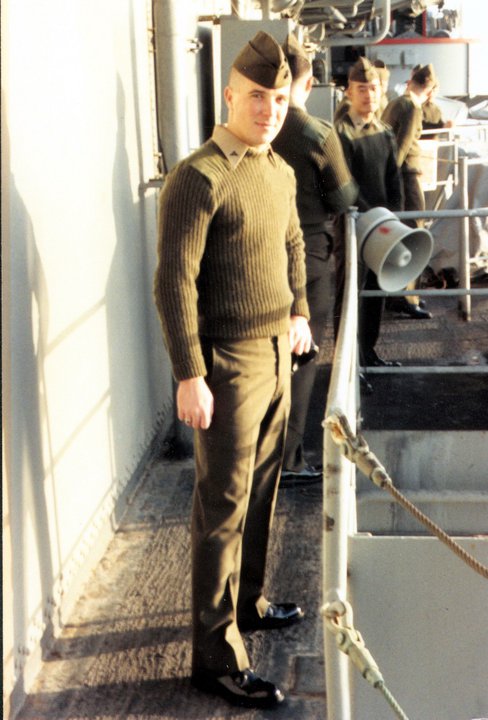Donor Spotlight: Robert Minichino
 I joined the Marines in 1988, after graduating from high school, because I had always wanted to be a Marine. After Operation Desert Storm, I went to northern Iraq in April of 1991 to help protect the Kurds from Saddam Hussein’s regime. On May 3, 1991, I was shot in the legs. The bullet went into my right leg, exploded on impact, a fragment went into my left leg, and then exited my left leg and went into another soldier’s heart and killed him within minutes. The wife of that Marine gave birth to their baby girl three days after his death. I lost a lot of blood because the bullet exploded on impact and it hit an artery, but everyone worked together that day to save my life. I was flown on a helicopter to Turkey, and then was flown to Germany, to Andrews Air Force Base, and then to Camp Lejeune in North Carolina. A week after I was shot, I developed a severe case of Complex Regional Pain Syndrome (CRPS) in my left foot as a result of the gunshot wound. My left foot had a burning sensation, like it was on fire, and it felt like someone was stabbing me in my foot over and over again. I remember screaming in total agony, and the pain medications they gave me didn’t really help that much. The pain syndrome continued for a few months until an anesthesiologist figured out what was going on, and gave me the diagnosis of CRPS. I went into remission after having about fifteen stellate ganglion nerve blocks. However, I still have pain sensations in that area whenever I am under stress. I’m grateful that I went into remission, because some people with CRPS never recover and have to live with that kind of pain for the rest of their lives. After discharge from the military, I went back to college and became a high school teacher. I feel lucky to have survived, and I am proud to call myself a Marine veteran.
I joined the Marines in 1988, after graduating from high school, because I had always wanted to be a Marine. After Operation Desert Storm, I went to northern Iraq in April of 1991 to help protect the Kurds from Saddam Hussein’s regime. On May 3, 1991, I was shot in the legs. The bullet went into my right leg, exploded on impact, a fragment went into my left leg, and then exited my left leg and went into another soldier’s heart and killed him within minutes. The wife of that Marine gave birth to their baby girl three days after his death. I lost a lot of blood because the bullet exploded on impact and it hit an artery, but everyone worked together that day to save my life. I was flown on a helicopter to Turkey, and then was flown to Germany, to Andrews Air Force Base, and then to Camp Lejeune in North Carolina. A week after I was shot, I developed a severe case of Complex Regional Pain Syndrome (CRPS) in my left foot as a result of the gunshot wound. My left foot had a burning sensation, like it was on fire, and it felt like someone was stabbing me in my foot over and over again. I remember screaming in total agony, and the pain medications they gave me didn’t really help that much. The pain syndrome continued for a few months until an anesthesiologist figured out what was going on, and gave me the diagnosis of CRPS. I went into remission after having about fifteen stellate ganglion nerve blocks. However, I still have pain sensations in that area whenever I am under stress. I’m grateful that I went into remission, because some people with CRPS never recover and have to live with that kind of pain for the rest of their lives. After discharge from the military, I went back to college and became a high school teacher. I feel lucky to have survived, and I am proud to call myself a Marine veteran.
I support the Pain Research Foundation because I would like to help other people who are going through what I experienced. If we can increase the amount of pain research being done, then we can find better ways to diagnose and treat people who are going through acute and chronic pain. No one should ever have to suffer unnecessarily. It’s hard to know what it’s like unless you’ve been there. For all these people coming home from Iraq and Afghanistan who are having pain from their injuries, I’d like to do what I can to try to give them a better life. If you do what you've always done, then you'll get what you've always gotten. I believe that you’re either a part of the solution or you’re a part of the problem, and I would like to be a part of the solution. That’s why I support the Pain Research Foundation.
Semper Fi
Robert Minichino
http://www.ted.com/talks/lang/en/elliot_krane_the_mystery_of_chronic_pain.html
If you would like to contribute a statement in 400 words or less about your experience with chronic pain, or your experience as a family member, friend or partner of someone with chronic pain, and why you support the Pain Research Foundation, please email your story to us. Contributions may be edited as needed.